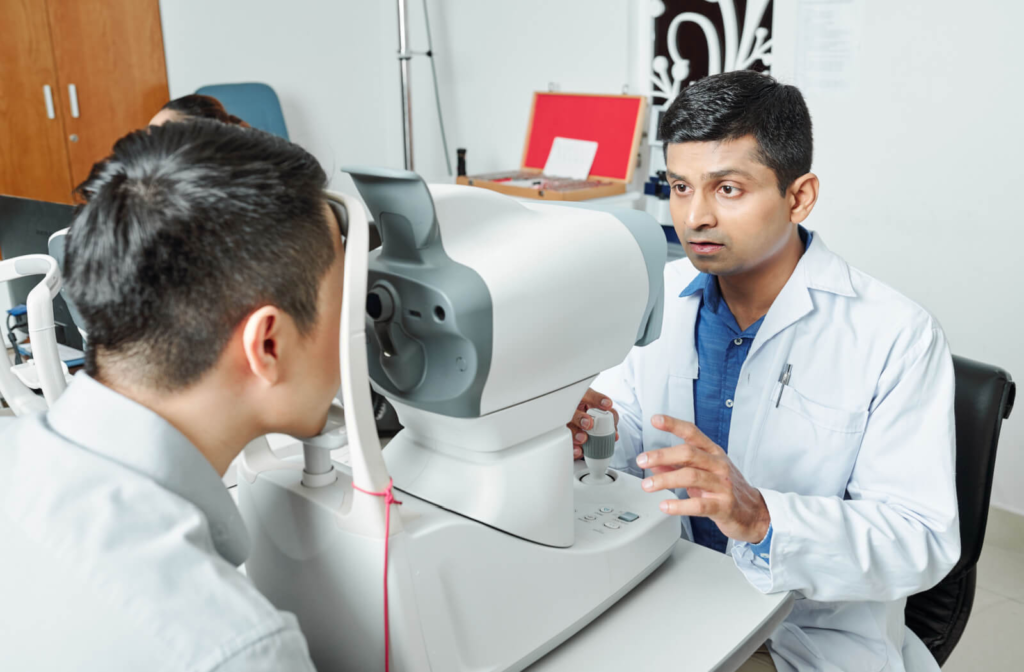There’s more to your eyes than you can see, and the internal structures are at just as much risk of disease and damage as the surface. Fortunately, your optometrist can use modern diagnostic technology to examine your eyes from inside to out.
Retinal imaging allows your optometrist to view the back of your eyes, looking for signs of eye disease and other conditions that can affect your general health.
How Does Retinal Imaging Work?
The retina is a layer of light-sensitive cells that line the back of your eye. When light passes through the cornea and lens, it focuses on the retina, which sends information through the optic nerve to the brain. This information is then processed to produce a clear view of the world.
Retinal imaging uses special cameras, such as Optomap imaging, to take digital pictures of the back of your eye. These pictures show the retina, the optic disk where the optic nerve connects, and the macula. Most importantly, it allows your optometrist to observe blood vessels.
The process of taking a picture is quick and comfortable. During the process, you’ll look into the Optomap device, but nothing will touch your eye. The most you should experience is a brief flash as an image is taken. This means retinal imaging is suitable for the whole family, including children.
How Often Should I Have Retinal Imaging Done?
Typically, your optometrist can take a retinal image without any prep, so it can be part of your regular eye exam to monitor your changing eye health. In some rare cases, you may need to take eye drops to dilate your pupils, but this depends on other health conditions, and your optometrist typically lets you know ahead of time, allowing you to prepare for a ride home.
The American Optometric Association recommends the following schedule for comprehensive eye exams:
- 6–12 months of age: 1 exam
- 3–5 years: At least 1 exam
- 6–17 years: Annual exams
- 18–64 years: At least every 2 years
- 65+ years: Annual exams
Depending on optometrist recommendations based on your eye health, you may need more frequent checkups.

What Is Retinal Imaging Used For?
One of the main benefits of retinal imaging is it gives a clear view of the blood vessels in your eyes. In fact, the retina is the only place where a doctor can see blood vessels directly. And since Optomap Imaging shows up to 82% of your retina, your optometrist can detect signs of disease that extend to your entire body.
Macular Degeneration
The macula sits in the center of your retina and is responsible for seeing the detail of objects right in front of you. This is invaluable for driving or recognizing faces and written text.
Your blood vessels can thin and leak as you age, which can lead to dry macular degeneration—the most common form of the disease. Or, abnormal blood vessels could grow under your retina and cause wet macular degeneration.
Retinal imaging allows your optometrist to diagnose the signs early and slow its progression before it leads to significant vision loss.
Glaucoma
Glaucoma typically happens when fluid builds up in your eyes and puts pressure on your optic nerve, damaging it.
Retinal imaging shows your eye doctor the optic disk, where the optic nerve connects to the retina and the blood vessels converge.
Diabetes
Though diabetes is mainly known for how it affects the way your body uses blood sugar, it can also damage the thin blood vessels in your eyes. In some cases, the eyes show the first signs of diabetes.
Other Health Conditions
By inspecting the blood vessels that can only be seen in the retina, your optometrist can look for early warning signs of other health conditions, such as:
- Strokes
- Cancer
- Cardiovascular diseases
Retinal imaging can be a go-to test if your vision is getting worse and you don’t know why.
Advanced Eye Care in Your Neighborhood
Detecting signs of eye disease early gives you a leg up when planning care. By being proactive, you can slow these life-changing conditions before they begin to affect your vision.
Total Vision Del Mar is proud to use Optomap retinal imaging to get a comprehensive view of your retina. Optomap is just one of the tools in our kit to find solutions for your eye and vision concerns.
Book an appointment with us for your next eye exam and see all that we have to offer!



